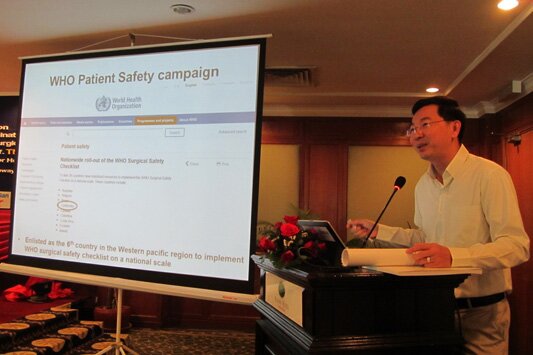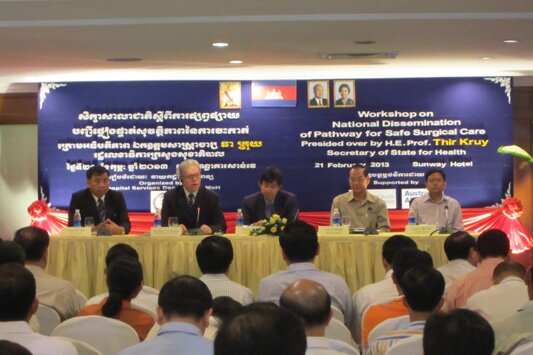Nationally implemented surgical safety checklists in Cambodia saves lives
Phnom Penh, Cambodia – Surgery is an essential part of health care. It can cure illness, reduce morbidity and save lives. Surgery also frequency leads to complications that include excess bleeding, wound infection, anesthesia problems and even death. Surgical complications are caused by many factors depending on the condition of the patient ranging from old age to health status. However for complications that are related to quality of health care, it is estimated that at least half could be avoided by routinely checking common safety issues and improving team communication.
General data for Cambodia is not available, but international studies show that complications due to surgery occur in up to 10% of cases. In high-income countries, death related to surgical complications can occur in 0.9%, whereas in low- and middle-income countries the rates soar to 11.7 % of surgery resulting in complications and 2.1% in death.
Simple ‘checklist’ may save lives – local adaptation recommended
To increase the safety of surgery, the World Health Organization (WHO) developed “Surgical Safety Checklist” in 2008. The checklist targets 10 essential objectives for safe surgery, such as surgery location, provision of safe anesthesia, the management of airway problems and hemorrhage.
The checklist is grouped into three sections, requiring the verbal check and exchange of information immediately before the induction of anesthesia, immediately before the skin incision and right after skin closure. WHO encourages local adaptation of the checklist if appropriate. It is recommended for the checklist to be read aloud and verbally confirmed within the operating team. This potential life saving process clocks-in at less than two minutes.
Effectiveness proven
The checklist has been evaluated in 8 different countries and settings and has proven its effectiveness. The use of the checklist reduced the rate of postoperative complications by more than one-third. WHO estimates that with the general use of the checklist up to half of related death case could be avoided. It is estimated that 234 million people are operated each year and more than one million of these individuals die from complications fatalities. Using the surgical checklist could result in more than 500,000 lives saved on an annually basis.
Improving quality of health care a top priority
The improvement of the quality of health care is one of the top priorities of the Ministry of Health (MoH) and is supported by the Social Health Protection Project of GIZ. Therefore the Quality Assurance Office of the MoH together with WHO Office in Cambodia identified the checklist as a ‘promising tool’ to increase the quality of surgical care.
Surgery in Cambodia, which is provided in public CPA 2, 3 and National Referral Hospitals, is on the rise. The changes in morbidity towards non-communicable diseases, such as cancer and traffic accidents are two of the reasons why this trend will probably persist.
Together with WHO, the Quality Assurance Office of the MoH developed a project plan to test the feasibility and the effects of the checklist. Financial support was received by funding from the Australian Agency for International Development, AusAID. The project included establishing an expert advisory board, a two-phased pilot, and a staff evaluation survey in participating hospitals.
Members of the advisory board included experienced surgeons as well as anesthesiologists and scientific associations, such as the Cambodian Surgical Society, donors and pilot hospitals. Pilot hospitals included the National Pediatric Hospital in Phnom Penh and the Referral Hospital in Svay Rieng.
Project pilot sites show promising results
The pilot, that took place from October 2012 to January 2013, showed promising results. As surgical safety improved, surgical complications (especially wound infections) decreased. Additionally, communication among surgical staff improved and awareness for quality improvement raised.
Survey results completed by surgeons, anesthesiologist and nurses showed a very positive attitude. For example, all participants affirmed that they would like the checklist to be used in case they had to undergo surgery themselves.
Checklist adapted nationwide
Due to these convincing results, MoH quickly officially approved the checklist. The Cambodian “Safe Surgery List” is now to be used nationwide in all public hospitals where major surgery is performed. Two dissemination workshops in February 2013 marked the official nationwide roll-out. The 170 participating surgeons, anesthesiologists and nurses of the according hospitals learned about the checklist, its use and expected effects. To enable them to train the staff in their institutions, they were provided with materials for training and dissemination.
Members of the advisory board took a very active role in this process. For example, their experience and expertise was applied to adapt the original WHO checklist to survey results and the local context and language. The board also provided the workshop audience with hands-on peer experience when presenting their results and answered critical questions related to content and handling of the checklist.
The checklist will be included in the up-dated CPA Guidelines, which define the role, function and service of public hospitals. An additional measure to ensure its national routine use will be the assessment of the checklists’ use during hospital assessment surveys. The monitoring and evaluation of the routine use this year will be supported by GIZ. These steps exemplify successful project cooperation.
The pilot was conducted by the QAO with technical support from a WHO officer and the integrated CIM-expert, funded by AusAID. Monitoring of its routine use in 2013 will be supported by GIZ.
Cambodia is now the 26th country worldwide and the 6th country in the WHO pacific region, which has implemented the checklist nationwide.
For more information on the Surgical Safety Checklist contact, Dr. Dominik Dietz, MPH, Quality Management Advisor, MoH, Hospital Service Department/ Quality Assurance Office (GIZ Social Health Protection Project)
Please find the Cambodian surgical safety checklist here:
English
Khmer


All activities are implemented by GIZ on behalf of the German Federal Ministry for Economic Cooperation and Development (BMZ).
- November 2014 (1)
- October 2014 (2)
- August 2014 (5)
- July 2014 (3)
- June 2014 (7)
- May 2014 (1)
- April 2014 (3)
- March 2014 (2)
- February 2014 (1)
- January 2014 (2)
- December 2013 (2)
- November 2013 (3)
- October 2013 (1)
- September 2013 (2)
- August 2013 (5)
- July 2013 (4)
- June 2013 (5)
- May 2013 (6)
- April 2013 (5)
- March 2013 (7)
- February 2013 (3)
- January 2013 (1)
- December 2012 (2)

